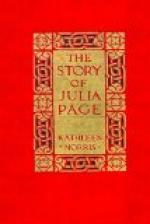But, indeed, he was an exceptionally good fellow. He was handsome, big, dashingly dressed. He was steady and successful in his work, domestic in his tastes, and tenderly—and perhaps to-day a little pityingly—devoted to this pretty, clever girl who loved him so, and had such faith in him. His life had kept him a good deal among men, and rather coarse men; he had had to do more drinking than he cared to do, to play a good deal of poker, to listen to a good deal of loose talk. Now, George felt a great relief that this was over; he wanted a home, a wife, children.
The bride and groom had a cloudless three weeks of honeymoon among a score of little Southern towns—and were scarcely less happy during the first months of settling down. Emeline was entirely ignorant of what was suitable or desirable in a home, and George had only the crude ideals of a travelling man to guide him. They enthusiastically selected a flat of four handsome, large, dark rooms, over a corner saloon, on O’Farrell Street. The building was new, the neighbourhood well built, and filled with stirring, interesting life. George said it was conveniently near the restaurant and theatre district, and to Emeline, after Mission Street, it seemed the very hub of the world. The suite consisted of a large front drawing-room, connected by enormous folding doors with a rear drawing-room, which the Pages would use as a bedroom, a large dining-room, and a dark kitchen, equipped with range and “water back.” There were several enormous closets, and the stairs and hall, used by the several tenants of the house, were carpeted richly. The Pages also carpeted their own rooms, hung the stiff folds of Nottingham lace curtains at the high narrow windows, and selected a set of the heavily upholstered furniture of the period for their drawing-room. When Emeline’s mother and sisters came to call, Emeline showed them her gold-framed pictures, her curly-maple bed and bureau, her glass closet in the dining-room, with its curved glass front and sides and its shining contents—berry saucers and almond dishes in pressed glass, and other luxuries to which the late Miss Cox had been entirely a stranger. Emeline was intoxicated with the freedom and the pleasures of her new life; George was out of town two or three nights a week, but when he was at home the two slept late of mornings, and loitered over their breakfast, Emeline in a loose wrapper, filling and refilling her coffee cup, while George rattled the paper and filled the room with the odour of cigarettes.
Then Emeline was left to put her house in order, and dress herself for the day—her corsets laced tight at the waist, her black hair crimped elaborately above her bang, her pleated skirts draped fashionably over her bustle. George would come back at one o’clock to take her to lunch, and after lunch they wandered up and down Kearney and Market streets, laughing and chatting, glad just to be alive and together. Sometimes they dined downtown, too, and afterward




